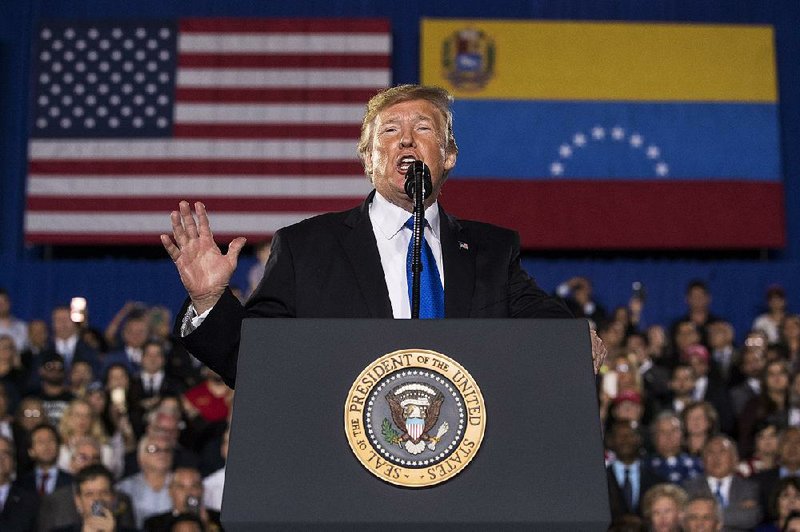WASHINGTON -- A coalition of 16 Democratic-controlled states, including California and New York, challenged President Donald Trump in court Monday over his plan to use emergency powers to spend billions of dollars on his border wall.
The lawsuit is part of a constitutional confrontation that Trump set off on Friday when he declared that he would spend billions of dollars more on border barriers than Congress had granted him. The clash raises questions over congressional control of spending, the scope of emergency powers granted to the president, and how far the courts are willing to go to settle such a dispute.
The suit, filed in U.S. District Court in San Francisco, argues that the president does not have the power to divert funds for constructing a wall along the Mexican border because Congress controls spending.
Xavier Becerra, the attorney general of California, said in an interview that the president had undercut his argument that there was an emergency at the border.
"Probably the best evidence is the president's own words," he said, referring to Trump's speech Friday, when he announced his plan by noting that "I didn't need to do this, but I'd rather do it much faster."
The lawsuit, California et al. v. Trump et al., says the plaintiff states are going to court to protect their residents, natural resources and economic interests. "Contrary to the will of Congress, the president has used the pretext of a manufactured 'crisis' of unlawful immigration to declare a national emergency and redirect federal dollars appropriated for drug interdiction and law enforcement initiatives toward building a wall on the United States-Mexico border," the lawsuit says.
The dispute stems from steps Trump said he would take after lawmakers granted him only $1.375 billion for new border barriers, legislation he signed last week to avoid another government shutdown.
Trump asserted the power to tap three additional pots of money on his own: $600 million from a Treasury Department asset forfeiture fund for law enforcement priorities; about $2.5 billion from a military anti-drug account, most of which would be siphoned from other military programs the Pentagon largely has yet to identify; and $3.6 billion in military construction funds that he said he could redirect by invoking an emergency-powers statute.
"Even though Trump's political maneuver to get around an uncooperative Congress looks like it stretches the Constitution, the questions presented in court will raise ordinary and complicated issues of administrative law," said Peter M. Shane, an Ohio State University law professor and co-author of a separation-of-powers casebook.
Two cases had already been filed after Trump's announcement -- one by the nonprofit watchdog group Public Citizen, representing several Texas landowners and a Texas environmental group, and the other a case jointly brought by the Center for Biological Diversity, Defenders of Wildlife and the Animal Legal Defense Fund.
At least two other lawsuits are expected to be filed later this week. The American Civil Liberties Union has announced its intention to file a case, but it has not yet publicly identified its client. The other case is to be brought by Protect Democracy, another watchdog group, and the Niskanen Center, a center-right policy institute, on behalf of El Paso County, Texas, and the Border Network for Human Rights.
Legal specialists expected the Justice Department to urge a court not to consider facts about the border or Trump's words, but rather to defer to the president's decision. The courts have a long history of being reluctant to substitute their own judgment for the president's about a security threat.
The Trump administration will have a powerful argument to invoke: In the National Emergencies Act, Congress defined no standard for what conditions have to be met before a president may determine that a qualifying crisis exists.
But before a judge could weigh whether Trump invoked the statute legitimately, he would have to decide whether the dispute was properly before the court in the first place.
Further complicating matters, the administration has said it intends to spend the funds in sequence, starting with the $1.375 billion Congress appropriated and reaching the emergency-power funding last. The Justice Department is likely to argue that if no disputed spending is imminent, then the case is not ripe for litigation and should be dismissed.
Ian Bassin, the executive director of Protect Democracy, said El Paso County would probably argue that its economy was being harmed by Trump's emergency declaration because it signaled to businesses and potential tourists that they should stay away.
The Justice Department declined to comment on the wave of lawsuits. Trump said he expected to be sued and to lose in lower courts, but he predicted he would eventually prevail before the Supreme Court.
But plaintiffs can also challenge whether the administration is interpreting several statutes correctly.
The provision that gives the secretary of defense the authority to transfer some Pentagon money from the anti-drug account Trump is planning to tap, for example, says it may be invoked "in no case where the item for which funds are requested has been denied by the Congress" -- raising the question of whether extra funding for border barriers counts as such a forbidden item.
And the emergency-powers statute Trump plans to use permits military construction spending in an emergency that requires the use of the armed forces for projects "to support such use." That has been used before to build up foreign military bases in a war effort, but litigants challenge whether a permanent wall to help civilian agencies police the border qualifies under that wording.
"Judges will certainly be aware of the larger institutional context when they address those technical issues, but that awareness will not, by itself, determine how the legal questions get resolved," Shane said.
A Section on 02/19/2019

